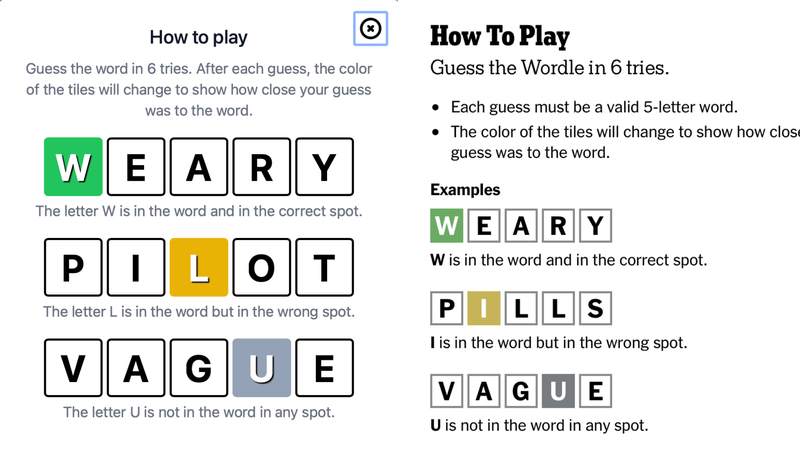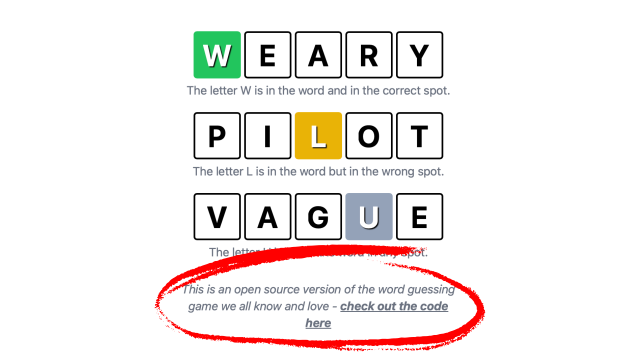The New York Times is on the hunt for copies of Wordle, the word-guessing game it acquired for seven figures in 2022. And it’s using takedown notices to kill 1,900 versions of the game housed on GitHub.
At the heart of the situation is the game “Reactle,” a Wordle copycat created by Developer Chase Wackerfuss in React JavaScript. The Times sent Wackerfuss a DMCA takedown request this week for infringing its Wordle copyright, according to a report from 404 Media. While he doesn’t mention Wordle by name, Wackerfuss described Reactle as “an open-source version of the word guessing game we all know and love,” and uploaded the code to a GitHub repository. (Wackerfuss claims he coded Reactle with a friend before the Times bought Wordle in 2022).
From there, Reactle’s code was forked, or copied, by other developers to make their own versions of the game more than 1,900 times. Some developers created versions of the game in different languages, including Hungarian and Persian. Others created versions based on specific themes. One Reactle offshoot called “Birdle,” for instance, was a Wordle clone where users had to guess the name of a specific bird.
The Times was not happy with Reactle or its hundreds of offshoots—and for good reason. Games have become an increasingly important part of the media organization, and Wordle is its biggest hit. Earlier this year, Axios reported that Wordle was played 4.8 billion times last year. Times executives told Axios that it strived to be “the premier subscription destination for puzzles.” It currently sells a games-only subscription for $US6 per month, although Wordle remains free to play.
In its DMCA takedown request, the Times said its copyright included the unique elements of Wordle’s gameplay, which it claimed had been copied exactly by Wackerfuss. It also asks GitHub to delete all of the forks of Reactle.
“The Times’s Wordle copyright includes the unique elements of its immensely popular game, such as the 5×6 grid, green tiles to indicate correct guesses, yellow tiles to indicate the correct letter but the wrong place within the word, and the keyboard directly beneath the grid,” a lawyer for the Times wrote in their request, which was sent to GitHub and then Wackerfuss. “This gameplay is copied exactly in the repository, and the owner instructs others how to knock off the game and create an identical word game.”

To be fair, an archived version of Reactle saved to the Internet Archive does look exactly like Wordle, minus the sleek Times-esque design. Wackerfuss told 404 Media that he decided to remove Reactle from GitHub after being informed of the takedown request.
“GitHub messaged me and I was just like, you know what, fuck this. I’m not going to get into a legal battle with The New York Times, so it wasn’t worth it to me and I just removed the game,” Wackerfuss told the outlet.
When reached by Gizmodo, Wackerfuss declined to comment on the situation with Reactle and the Times. However, he told 404 Media that he had not been acting in “bad faith.”
“To me, Wordle is like Tetris or a deck of cards. It’s such a simple premise,” Wackerfuss said. “And you look at what people did with the GitHub repo and it’s like, a Taylor Swift version, a version in all different types of languages. The New York Times would never build those, so I’m not sure why they feel like we’re encroaching on their IP.”
The Times, meanwhile, sent Gizmodo the following statement when asked about Reactle, specifically requesting its statement be printed in full:
“The Times has no issue with individuals creating similar word games that do not infringe The Times’s ‘Wordle’ trademarks or copyrighted gameplay. The Times took action against a GitHub user and others who shared his code to defend its intellectual property rights in Wordle. The user created a ‘Wordle clone’ project that instructed others how to create a knock-off version of The Times’s Wordle game featuring many of the same copyrighted elements. As a result, hundreds of websites began popping up with knock-off ‘Wordle’ games that used The Times’s ‘Wordle’ trademark and copyrighted gameplay without authorization or permission. GitHub provided the user with an opportunity to alter his code and remove references to Wordle, but he declined.”
It’s not immediately clear whether the 1,900 Wordle clones based on Wackerfuss’ code will disappear in short order, too. GitHub declined to comment on whether it was taking action on the Reactle forks.
“We review all DMCA takedown requests thoroughly,” GitHub told Gizmodo in an emailed statement. “If we find a request to be sufficiently detailed, we post it in our public repository and give the affected user(s) an opportunity to make changes before processing.”
